- Home
- Michael Chabon
Summerland Page 2
Summerland Read online
Page 2
"I don't think so, Feld," she said. She gave her gum another loud snap. "Not going to happen."
And that was the end of the discussion.
CLAM ISLAND WAS A SMALL, GREEN, DAMP CORNER OF THE WORLD. It was known, if at all, mostly for three things. First was its clams. Second was the collapse, in 1943, of the giant Clam Narrows Bridge. You might have seen an old film of that spectacular disaster, on TV: the long steel bridge-deck flapping and whipping around like a gigantic loose shoelace just before it falls to pieces and splashes into the chilly waters of Puget Sound. The Clam Islanders had never really taken to the bridge that connected them to the mainland, and they were not sorry to see it go. They went back to riding the Clam Island Ferry, which they greatly preferred. You could not get a cup of coffee or clam chowder, or hear all about your neighbor's sick cousin or chicken, on the Clam Narrows Bridge. From time to time, there would be talk of rebuilding the span, but a lot of people seemed to feel that maybe there just ought not to be a bridge connecting Clam Island to the mainland. Islands have always been strange and magical places; crossing the water to reach them ought to be, even in a small way, an adventure.
The last thing that Clam Island was known for, along with its excellent clams (if you liked clams) and its falling-down bridge, was its rain. Even in a part of the world where the people were accustomed to drizzles and downpours, Clam Island was considered uncommonly damp. It was said that at least once a day, on Clam Island, in winter or summer, it rained for at least twenty minutes. People said this about Clam Island on Orcas Island, and on San Juan Island, and down in Tacoma and Seattle. But the people of Clam Island knew that this saying was not entirely true. They knew—it was one of the first things they learned as children about their home—that at the westernmost tip of the island, in the summertime, it never rained. Not even for a minute and a half. A tiny, freak weather system ensured that this zone of the island, perhaps a square mile in all, knew a June, July, and August that were perfectly dry and sunshiny.
Clam Island, seen on a map, looked like a boar that was running west. It had a big snout—called the West End—tipped with a single long jagged tusk. Most of the locals called this westernmost spit where it never rained in the summer the Boar Tooth, or the West Tooth, or just the Tooth; to others it was always known as Summerland. The Tooth was where the island's young people went to while away their long vacations, where the club picnics, league barbecues, and summer weddings were put on, and, above all, it was where the islanders went to play baseball.
They had been playing there since shortly after the arrival of the Clam Island pioneers in 1872. At the back of Hurley's Hardware, in town, there was a photograph of a bunch of tough-looking loggers and fishermen, in old-time flannels and mustaches, posing with their bats in the shade of a spreading madrona tree. The picture was captioned CLAM ISLAND NINE, SUMMERLAND, 1883.
For a long time—so long that men were born, grew up, and died in the arms of the game—baseball flourished on Clam Island. There were a dozen different leagues, made up of players of all ages, both male and female. Times had been better on Clam Island in those days. People were once more partial to eating raw shellfish than they are now. An ordinary American working man, not so long ago, thought nothing of tossing back three or four dozen salty, slippery bivalves at lunch. The Clam Boom and the universal love of baseball had gone hand in hand for many years. Now the clam beds had been mostly spoiled by plankton blooms and pollution, and as for the young people of Clam Island, even though some of them could hit, run, and catch the ball, the sad truth was that none of them really cared for baseball very much. Many preferred basketball, and others preferred riding dirt bicycles, and some just liked to watch sports on television. By the time of the season I want to tell you about, the Clam Island Mustang League was home to just four teams. There were the Shopway Angels, the Dick Helsing Realty Reds, the Bigfoot Tavern Bigfoots—and the Roosters, who had, as has already been mentioned, lost all of their first seven games. In the grand scheme of the universe, losing the first seven games of the season is nothing too grave, but to the Roosters it felt awful. Ethan was not the only one who had contemplated quitting the team.
"Now, listen, you kids," Mr. Olafssen said, that afternoon, gathering the Roosters around him before the game. Mr. Olafssen was a very tall, thin man with hair the color of yellowed newspaper and a sad expression. He'd had the expression even before the season began, so Ethan knew that it was not his fault that Mr. Olafssen looked so sad, but nevertheless whenever he looked at his coach, Ethan felt guilty. Kyle Olafssen, Mr. Olafssen's son, played third base, and he was also the Roosters' second-best pitcher after Danny Desjardins. He could throw pretty hard for a kid, but without much control, and since he was always in a bad mood the kids on the other teams were a little afraid of him. That was probably the best thing that Kyle had going for himself as a pitcher—he was a sourpuss, and wild.
"I know some of you left the last game feeling a little down," Mr. Olafssen continued. "And it was a tough loss." Ethan could feel, like a kind of magnetic force acting on the fillings of his teeth or something, how hard Mr. Olafssen was trying not to look at him, and his three errors, with those sad pale eyes. Ethan was grateful to Mr. Olafssen—nothing made Ethan Feld happier than the knowledge that nobody was looking at him—but he blushed all the same. "Now, you look at our record, you see oh and seven, I know it's hard not to feel a little down. But what is a record? It's just some numbers on a piece of paper. It doesn't reflect who we are as people, and it doesn't reflect who we are as a team."
"Actually," said a deep voice, "if you had enough data, you could reduce every human being to a series of numbers and coordinates on a piece of paper."
The Roosters, who had been listening to Mr. Olafssen with a certain amount of trust, hope, and willingness to believe him, now burst into derisive laughter. Mr. Olafssen frowned as his point was spoiled. He turned, looking very annoyed, toward Thor Wignutt, who stood, as ever, just outside the circle of kids.
Though he was the same age as all of them, Thor towered over the other Roosters and was, in fact, the tallest eleven-year-old on Clam Island, as he had been the tallest nine-year-old, and the tallest five-year-old, and the tallest toddler, too. The top of Thor's head reached almost to the base of Mr. Olafssen's throat, and he was, if anything, broader in the shoulders. Thor was a kind of prodigy of growth in every way. He had a voice like stones rolling in a metal drum, and dark hair on his lips and cheek. He wore heavy black glasses and was generally regarded as smart, but unfortunately he was under the impression—most of the time—that he was a synthetic humanoid named TW03. TW03, as Thor never tired of explaining, was the most sophisticated and marvelous piece of machinery in the history of the universe. But of course like all synthetic humanoids, for some reason he wanted nothing more than to be human. Thinking of himself as somebody who was not human, but was trying very hard, as you might imagine, often got in the way of Thor's relations with other kids his age. With his big arms and shoulders, he looked like he would be a fabulous power hitter, but usually he was out on three pitches.
"Thor," Mr. Olafssen said. "What have I told you about interrupting me to make these ridiculous statements of yours without offering the slightest shred of evidence to back them up?"
During the last game, Thor had distracted everyone with his theory that there was an active underground volcano directly beneath the Tooth that was responsible for keeping the place dry in the summertime. He claimed to be able to detect seismic disturbances with his "logical sensor array." His constant reiteration of "one of these days that thing is going to blow this entire quadrant to atoms" had irritated Mr. Olafssen nearly as much as Ethan's poor play in the field.
"Can you prove it, Thor?" Mr. Olafssen wanted to know. "Have you got a piece of paper with me written on it?"
Thor blinked. He was standing right behind Jennifer T., who was the only person on the team, and perhaps on the entire island, who ever bothered to treat Thor like a more or le
ss normal person. She had even been over to his house, where, it was said, Mrs. Wignutt, immensely fat, lived inside a clear plastic tent breathing air out of a tank. According to Jennifer T., however, there had been no sign of any tent, or of Thor's gigantic mother, for that matter.
"It's true," Thor insisted finally. He was very stubborn in his ideas, which Ethan supposed was the case with synthetic humanoids, given the fact that they were, well, programmed. Ethan was probably the person, after Jennifer T., who was the friendliest with Thor, but he never treated Thor like a more or less normal person. It was clear to Ethan that Thor was not.
"Have you brought us any charts, Thor?" Mr. Olafssen pressed on. He seemed determined to beat Thor at his own game. "Do you have any proof at all?"
Thor hesitated, then shook his head.
"Then I'll thank you to keep your chipset occupied with solving calculations involving balls and bats."
"Yes, sir," Thor said.
"Now, then," Mr. Olafssen began, glancing across the field at the Angels, whose coach, Mr. Ganse, was passing out a pair of wristbands, in the Angels colors of red and blue, to each of the boys on his team. The Angels had told everyone about the wristbands that they would be receiving that afternoon, as their reward for having won all of their first seven games that season. They were each ornamented with a picture of the great Rodrigo Buendía, the star slugger for the big-league Angels, in Anaheim. "Here is what I would like us to do this afternoon. I want us to focus—"
"Dad?"
"Quiet, Kyle. Now. The focus for the game today is going to be on—"
"Dad!"
"Kyle, darn it, if you don't let me talk—"
"We just want to know something." Danny Desjardins and Tucker Corr, who were standing on either side of Kyle, looked at Ethan, who froze. He could feel the question that was coming like a trapdoor opening at the bottom of his stomach.
"What is it, Kyle?"
"Are you going to play Feld today?"
Mr. Olafssen could prevent it no longer. His sorry gaze wavered, then swung around and fastened, with a snap that you could almost hear, on Ethan. He ran the tip of his tongue around his lips. Ethan could feel all the other kids on the team watching him, hoping and praying with all of their might, that Ethan would be benched. And the worst of it was that Ethan too prayed that Mr. Olafssen would say, Well, no, he sort of thought maybe Ethan had better sit this one out. Ethan hated himself for hoping for this. He glanced over to the bleachers, where his father sat, in his size XXL Roosters jersey, among the other fathers and mothers. Mr. Feld noticed Ethan looking at him, and raised one hand in a fist, as if to say Go get 'em, Slugger, or something doofusy like that, and smiled a great big, horrible, hopeful smile. Ethan looked away.
"I think you'd better shut your mouth, Kyle Olafssen," Mr. Olafssen finally said. "Before I bench your narrow behind."
The Angels took the field. The Roosters came together and built a tower of their hands, slapping them, one by one, into a pile. Then they yelled, all together, "Break!" They did this before every game; Ethan had no idea why. But he figured that everybody else must know, and he was too embarrassed to ask. He had missed the first five minutes of the first day of practice and assumed that it had been explained then.
All the Roosters sat down, except for Jennifer T., who batted lead-off, and Kris Langenfelter, the shortstop, who was on deck. Ethan found a spot at the very end of the bench and waited, cap in his lap, to learn his fate.
Things got off to a good start, at least from his craven and shameful point of view, when the Roosters proved unable to score Jennifer T., who led off the game with a signature double, a seed that squirted off her bat over the shortstop's head and into left field. Then in the bottom of the first, the Angels got on the scoreboard right away with a pair of runs. Ethan relaxed a little, secure in the knowledge that Mr. Olafssen would never risk dropping further behind by putting him in. He sat back on the bench, folded his hands behind his head, and looked up at the blue Summerland sky. Over the rest of Clam Island the sky, as usual during the summer months, was more pearly than blue, gray but full of light, as though a thin cotton bandage had been stretched across the sun. Here in Summerland, however, the sky was cloudless and a rich, dark, blue, almost ultramarine. The air was fragrant with a beach smell of drying seaweed and the tang of the gray-green water that surrounded the Tooth on three sides. The sun felt warm on Ethan's cheeks. He half closed his eyes. Maybe, he thought, baseball was a sport best enjoyed from the bench.
"You better be ready, kid," said a voice just behind him. "Pretty soon now you going to get the call."
Ethan looked behind him. On the other side of the low chain-link fence that separated the ball field from the spectator area leaned a dark little man with bright green eyes. He was an old man, with white hair pulled back into a ponytail and a big, intelligent nose. His skin was the color of a well-oiled baseball glove. The expression on his face was half mocking and half annoyed, as if he had been disappointed to catch Ethan napping, but not surprised. There was something in his face that said he knew Ethan Feld.
"Do you know that guy?" Ethan asked Thor in a low voice.
"Negative."
"He's looking at me."
"He does appear to be observing you, Captain."
"Excuse me, sir?" Ethan said to the old man with the ponytail. "What did you just say?"
"I was merely observatin', young man, that sooner than you think you goin' to find yourself in the game."
Ethan decided that the old guy was joking, or thought that he was. An informal survey that Ethan had once conducted seemed to indicate that fully seventy-three percent of the things that adults said to him in the course of a day were intended to be jokes. But there was something in the man's tone that worried him. So he adopted his usual strategy with adult humor, and pretended that he hadn't heard.
In the top of the fourth, Jennifer T. came up to bat again. She carried her slim blond bat over her shoulder like a fishing pole. She stepped up to home plate with her gaze at her shoetops. You could tell that she was thinking, and that what she was thinking about was getting a hit. Jennifer T. was the only member of the Roosters—maybe the only kid on the whole Island of Clam—who truly loved baseball. She loved to wear a bright smear of green grass on her uniform pants and to hear her bat ringing in her hands like a bell. She could hit for average and with power, turn a double play all by herself, stretch a base hit into a triple and a triple into an inside-the-park home run. She never bragged about how good she was, or did anything to try to make the other players look bad. She did, however, insist that you call her "Jennifer T.," and not just "Jennifer" or, worst of all, "Jenny."
Bobby Bladen, the Angels' pitcher, came in low and outside to Jennifer T. Jennifer T. had long arms, and she liked her pitches outside. She reached out with her slim bat and once again sent the ball slicing over the shortstop's head and into left field. The left fielder had a good arm, and he got the ball right in to the second baseman, but when the dust settled Jennifer T. was safe with another double.
"Here it come, kid," said the old man. "Get ready."
Ethan turned to give this annoying elderly person a dirty look, but to his surprise he found that there was nobody there. Then he heard the crack of a bat, and the Roosters and all their parents cheering. Sure enough, Jennifer T. had started something. Troy Knadel singled, scoring Jennifer T., and after that, as Mr. Feld later put it, the wheels came off Bobby Bladen. The Roosters batted all the way around the order. The next time that she came up that inning, Jennifer T. drew a walk and stole second. When Kyle Olafssen finally made the third out, the Roosters had taken a 7–2 lead.
"Mr. Wignutt," barked Mr. Olafssen. His face was all red and his pale eyes were just a little crazy looking. Five runs was the biggest lead the Roosters had had all season. "Take third."
"But, Dad," said Kyle Olafssen. "I'm third."
"You're third something, all right," said Mr. Olafssen. "Third what, I have no idea. Have a seat, son, yo
u're out of the game. Wignutt, get your synthetic hiney out onto the field." He started to give Thor's shoulder a shove in the direction of third base but then glanced at Ethan, and hesitated. "Oh, and, uh, upload your, uh, your infielding software."
Thor leapt instantly to his feet. "Yes, sir"
Ethan's heart began to pound. What if the Roosters were able to hold the lead? What if they added a few more runs? If Mr. Olafssen felt comfortable putting Thor into the game with a five-run lead, how many runs would the Roosters need before he would consider putting Ethan in? Ethan had not the slightest doubt in his ability to erase a six-, seven-, even an eight-run lead, single-handedly.
Every time he looked over toward the bleachers and saw his father sitting there, squinting, with that big carnation of a smile wilting on his face, the feeling of dread grew stronger. Then, in their half of the fifth, the Roosters added two more runs, and Ethan really began to panic. Mr. Olafssen kept glancing his way, and there were only two innings left to go after this one. The Angels put in a new pitcher, and Jennifer T. came to the plate again. This time she hit a soft line drive deep into the grass of left-center and lighted out for second. There were two men on: that made it 11–2. Ethan stole another look at his father and saw that the strange little old man had reappeared and was sitting right beside Mr. Feld now, and staring, not at the action on the field, like the normal people in the bleachers, but right at Ethan. The old man nodded, then fit his fists together as if they were stacked up on the handle of a bat, and swung. He pointed at Ethan, and grinned. Ethan looked away. His gaze traveled around the field, toward the parking lot, then out beyond that to the edge of the woods. There, atop a fallen birch, he caught a glimpse of something quick and ruddy, with a luxuriant tail.

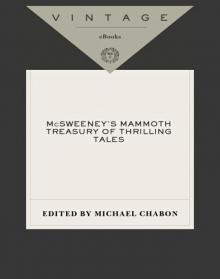 McSweeney's Mammoth Treasury of Thrilling Tales
McSweeney's Mammoth Treasury of Thrilling Tales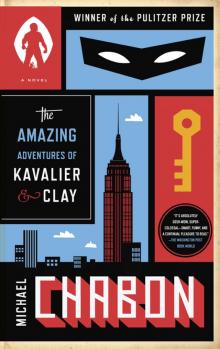 The Amazing Adventures of Kavalier & Clay
The Amazing Adventures of Kavalier & Clay The Yiddish Policemen's Union
The Yiddish Policemen's Union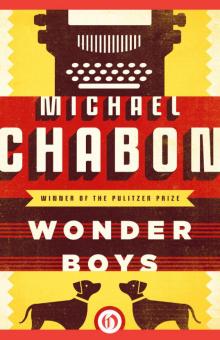 Wonder Boys
Wonder Boys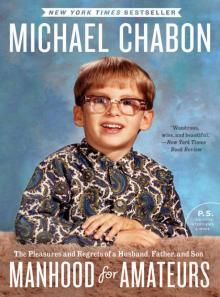 Manhood for Amateurs
Manhood for Amateurs Kingdom of Olives and Ash: Writers Confront the Occupation
Kingdom of Olives and Ash: Writers Confront the Occupation Gentlemen of the Road: A Tale of Adventure
Gentlemen of the Road: A Tale of Adventure A Model World and Other Stories
A Model World and Other Stories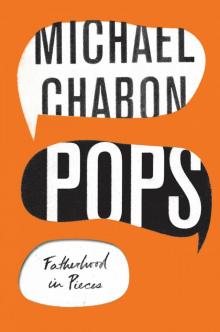 Pops: Fatherhood in Pieces
Pops: Fatherhood in Pieces McSweeney's Enchanted Chamber of Astonishing Stories
McSweeney's Enchanted Chamber of Astonishing Stories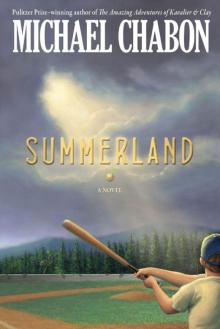 Summerland
Summerland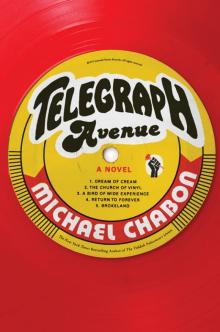 Telegraph Avenue
Telegraph Avenue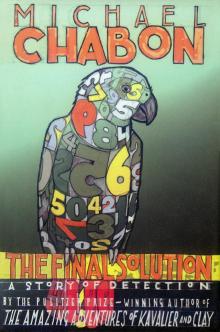 The Final Solution
The Final Solution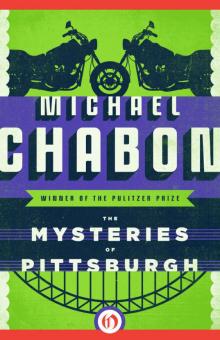 The Mysteries of Pittsburgh
The Mysteries of Pittsburgh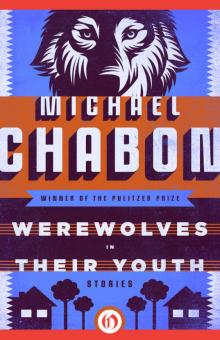 Werewolves in Their Youth
Werewolves in Their Youth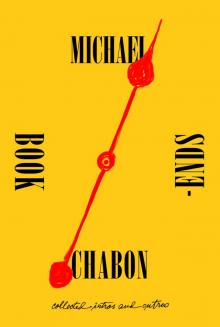 Bookends
Bookends Fight of the Century
Fight of the Century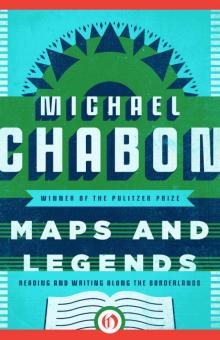 Maps and Legends
Maps and Legends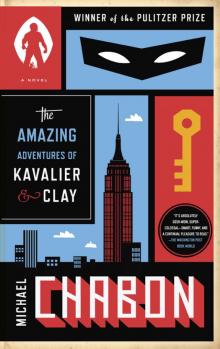 The Amazing Adventures of Kavalier & Clay (with bonus content)
The Amazing Adventures of Kavalier & Clay (with bonus content) Kingdom of Olives and Ash
Kingdom of Olives and Ash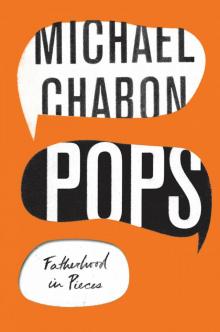 Pops
Pops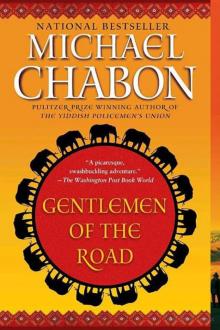 Gentlemen of the Road
Gentlemen of the Road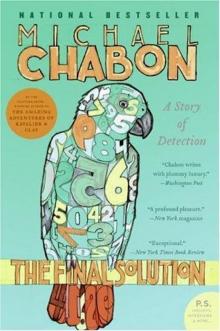 The Final Solution: A Story of Detection
The Final Solution: A Story of Detection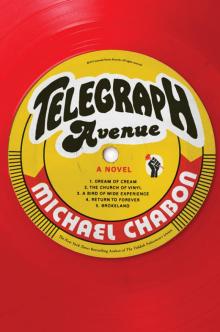 Telegraph Avenue: A Novel
Telegraph Avenue: A Novel